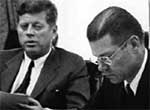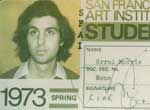Over the years I have read with avidity various intellectual disputes in The New York Review of Books and other literary journals. But I have never imagined myself being a part of one of them. However, I found Eric Alterman's December 15th "Stop the Presses" column on my recent film, The Fog of War, so devoid of historical scholarship (despite his claim of having worked on his PhD. for eleven years) that I feel compelled to respond.
Alterman called me just after he finished writing the piece, first leaving a message with my office that I needed to be "prepared to answer some difficult questions." I called him. He read me sections of the piece. In particular, the passage: "After the screening of the film... [Morris] argued that the popular view of a 'vacillatory Johnson and advisors like McNamara breathing down his neck' for war was false. Well, Morris is a brilliant filmmaker, but he is not a historian." Of course, I didn't care for his suggestion that the history in the film is flawed. But I am willing to acknowledge my errors and mistakes. I just would like them to be clearly elucidated.
Alterman went on to portray McNamara as the prime mover in the conflict: it is a bellicose McNamara egging on a vacillatory LBJ. This view is widely held and has become one of the central myths about the escalation of the war. McNamara, the number cruncher, the statistician, the "IBM machine with legs" goaded LBJ into war, and then cried alligator tears when it was too damn late. (Last year, HBO presented The Path to War, Frankenheimer's last film - with Alec Baldwin playing Robert McNamara. Not surprisingly, it promoted this same thesis: LBJ vacillatory; McNamara bellicose.)
The only problem with this account is that it is not compatible with recently released historical documentation - in particular, JFK's recordings of his cabinet meetings and LBJ's selective recordings of his phone conversations.
One of the recordings that most interests me - and which has been included in The Fog of War - is a JFK cabinet meeting from October 2nd, 1963 that occurred just after McNamara had returned from an inspection trip to Vietnam. In the meeting, McNamara argues for the removal of 1,000 U.S. advisors from Vietnam by Christmas time and the removal of the remaining 15,000 advisors by 1965. McNamara cites this conversation in his Vietnam opus, In Retrospect, but it has only recently been released to the public by the Kennedy library. Here is an exchange between Kennedy and McNamara:
Kennedy: The advantage to taking them out is?
McNamara: We can say to the Congress and people that we do have a plan for reducing the exposure of U.S. combat personnel.
Kennedy: My only reservation about it is if the war doesn't continue to go well, it will look like we were overly optimistic.
McNamara: We need a way to get out of Vietnam, and this is a way of doing it.
Soon after taking office, Lyndon Johnson began covertly recording his telephone conversations. In one of these conversations from February 25th 1964 - approximately three months after Kennedy's assassination - Johnson can be heard chastising McNamara for that recommendation to remove advisors from Vietnam:
Johnson: I always thought it was foolish for you to make any statements about withdrawing. I thought it was bad psychologically. But you and the President thought otherwise, and I just sat silent.
McNamara: The problem is...
Johnson: Then come the questions: how in the hell does McNamara think, when he's losing a war, he can pull men out of there?
What is important about this conversation is that Johnson is stating unequivocally that he disagreed (although he remained silent) with McNamara's and JFK's decision to withdraw advisors starting in 1963, to culminate in all of them being removed by 1965, after the 1964 presidential election.
In a recent article "Exit Strategies" by James Galbraith in The Boston Review, Galbraith writes about the October 2nd meeting and wonders why it has been so often neglected by historians and journalists. Why indeed? My theory is that it runs counter to what most people want to hear. (But just because it isn't what people want to hear, doesn't mean it isn't true.)
My conversation with Alterman was somewhat surreal. I asked him: How do you account for these conversations...? Alterman answered: I don't have to. I answered: Yes, you do. If you believe that McNamara pressed a vacillatory Johnson into war, you have to explain what's going on in this period immediately before and after JFK's assassination. These conversations are part of it. Alterman answered: Well, I could pick another set of conversations that prove the exact opposite. I urged him to do so. He said there are dozens of conversations that show Johnson confused, hand wringing, vacillatory. Finally, he read several from 1965.
I said: Not relevant. The issue is late 1963 and early 1964. Sure, Johnson was given to self-pity, self-doubt, hand-wringing about his decisions to escalate, but as the historian Fredrik Logevall wrote in his 1999 work, Choosing War: The Lost Chance and the Escalation of War in Vietnam: "Johnson's doubts, though considerable...centered on whether the war effort would be successful rather than on whether it should be undertaken." (There is also the important question of whether it suited Johnson to portray himself publicly as being reluctant to escalate, in spite of what his real intentions may have been in the matter.)
The February 25th, 1964 conversation between Lyndon Johnson and Robert McNamara provides evidence that Johnson had no intention of losing the war in Vietnam. It also reveals that he did not agree with McNamara's plan for withdrawal; and, that he formulated this belief before Kennedy's assassination and before Diem's assassination, as early as October 2nd, 1963 and probably before. I urged Alterman to read Galbraith's piece. He told me he didn't have to. He had read other pieces Galbraith has written...
The story of Robert McNamara as told in The Fog of War certainly does not let McNamara off the hook. It is a different story, not a better one. If McNamara was skeptical of increased U.S. involvement in Vietnam, why did he support bombing North Vietnam in March of 1965 and the 100,000 men troop increase in July of 1965? Why did he publicly support the Vietnam War if he was afflicted with private doubts? Did his loyalty to Johnson, to the office of the Presidency, trump his better inclinations? Or, did he reassess the dangers to the United States of a unified, Communist Vietnam?
It is not my intention to exonerate McNamara for his involvement in the planning of the Vietnam War. What I do intend is to help correct a common misconception that President Johnson was bullied into a war that he had no intention of fighting. Is this important? Does this matter? Yes, because what we are now faced with is this question: what do you do if you serve a president who wants to go to war no matter what? What protections are provided for this contingency within our system of government? What recourse does a cabinet member have if he disagrees with a president's policies? Should he go to Congress? To the public? Or, should he stay and try to change policy within the government? These are particularly pertinent questions that unfortunately are not being asked. I'm not at all certain that we can learn from history, but we certainly can't learn from it if it is ignored. Santayana is well known for saying: Those that are unfamiliar with history are condemned to repeat it. He is less known for a far more interesting quote: History is wrong, and always has to be rewritten. In recent years, the transcripts of Kennedy's Executive Committee meetings on the Cuban Missile Crisis have been transcribed, edited and annotated by Ernest May and Philip Zelikow. Likewise, the Johnson telephone conversations (which have been released in some instances in the last few months) provide new information on Johnson, McNamara and the Vietnam War. I believe that The Fog of War has used this information to shed new light on complex historical events.
Mr. Alterman was kind enough to inform me that he is writing the "definitive" book on the Gulf of Tonkin and the Cuban Missile Crisis. Interesting of him to decide this in advance of publication. Forgive me, if I seem skeptical.
'Fog of War' vs. 'Stop the Presses'







